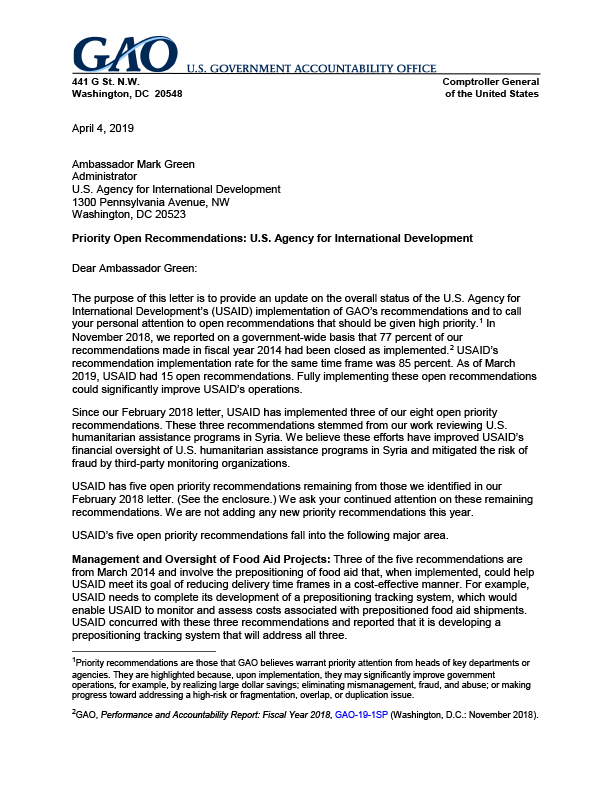Speeches Shim
PRIORITY OPEN RECOMMENDATIONS:
U.S. Agency for International Development
GAO-19-421SP: Published: Apr 4, 2019. Publicly Released: Apr 11, 2019.
Each year, we make more than 1,000 recommendations to help improve the federal government. We alert department heads to the recommendations where they can save the most money, address issues on our High Risk List, or significantly improve government operations.
This report outlines our 5 priority open recommendations for USAID as of April 2019.
For example, in March 2014 we recommended that USAID collect data on delivery time frames for all emergency food aid shipments to help it meet its goal of delivery times in a cost-effective manner.
Since our previous letter in February 2018, USAID implemented 3 of our priority recommendations.
Priority Open Recommendations to the U.S. Agency for International Development (USAID)
Management and Oversight of Food Aid Projects
International Food Aid: Prepositioning Speeds Delivery of Emergency Aid, but Additional Monitoring of Time Frames and Costs Is Needed. GAO-14-277. Washington, D.C.: March 5, 2014.
Recommendation: To strengthen USAID's ability to help ensure that its food aid prepositioning program meets the goal of reducing delivery time frames in a cost-effective manner, the USAID Administrator should systematically collect, and ensure the reliability and validity of, data on delivery time frames for all emergency food aid shipments, including prepositioned food aid shipments.
Actions Needed: USAID concurred with this recommendation. Because its initial efforts to develop a prepositioning tracking program did not lead to a viable program, USAID said it is focusing on developing a system that incorporates commercial platforms. To implement this recommendation, USAID needs to complete its development of a prepositioning tracking system.
Recommendation: To strengthen USAID's ability to help ensure that its food aid prepositioning program meets the goal of reducing delivery time frames in a cost-effective manner, the USAID Administrator should systematically monitor and assess data on delivery time frames for prepositioned food aid shipments.
Actions Needed: USAID concurred with this recommendation. In 2017, USAID noted that the prepositioning tracking system under development would monitor and assess data on delivery time frames for prepositioned food aid shipments. However, USAID has yet to complete its development of a prepositioning tracking system.
Recommendation: To strengthen USAID's ability to help ensure that its food aid prepositioning program meets the goal of reducing delivery time frames in a cost-effective manner, the USAID Administrator should systematically monitor and assess costs associated with commodity procurement, shipping, and storage for prepositioned food aid shipments.
Actions Needed: USAID concurred with this recommendation. In 2017, USAID noted that the prepositioning tracking system under development would monitor and assess costs associated with commodity procurement, shipping, and storage for prepositioned food aid shipments. However, USAID has yet to complete its development of a prepositioning tracking system.
Recommendation: To enhance USAID's financial oversight of implementing partners' spending to implement and support Title II development and emergency projects, the USAID Administrator should develop, document, and implement a process for periodically conducting systematic, targeted financial reviews of Title II development and emergency projects. Such reviews should include efforts to verify that actual costs incurred for these projects align with planned budgets.
Actions Needed: USAID concurred with this recommendation. Although officials told us that USAID conducted two financial reviews of Title II development and emergency projects in 2018, USAID needs to implement a process for periodically conducting these reviews to fully implement this recommendation.
Recommendation: To enhance USAID's financial oversight of implementing partners' spending to implement and support Title II development and emergency projects, the USAID Administrator should take steps to ensure that it collects complete and consistent monitoring data from implementing partners for Title II development and emergency projects on the use of 202(e) funding for cash transfers, food vouchers, and local and regional procurement as well as data on the use of Title II funding for internal transportation, storage, and handling (ITSH) costs, in accordance with established requirements.
Actions Needed: USAID concurred with this recommendation. In response, USAID informed us that it had added a performance reporting requirement to its Food for Peace development award template, and also developed a new World Food Program emergency award template with reporting requirements for monitoring data on cash transfers, food vouchers, and local and regional procurement activities. However, USAID still needs to provide evidence that it collects complete and consistent monitoring data from implementing partners for Title II projects, in accordance with established requirements.
Managing Director: Thomas Melito
Contact information: melitot@gao.gov or 202-512-9601


Comment
Make a general inquiry or suggest an improvement.